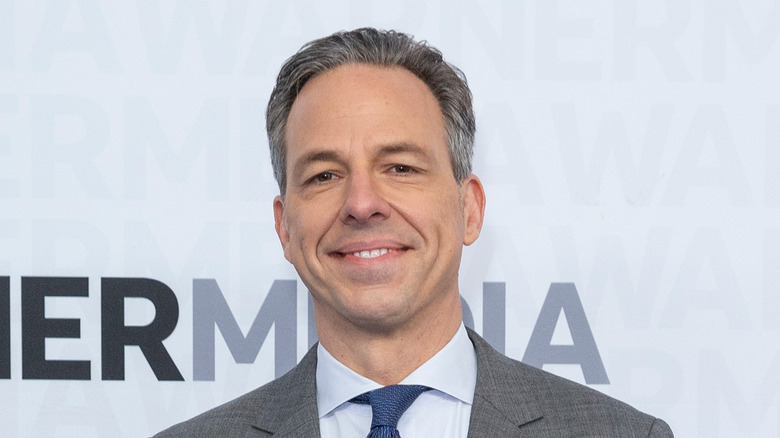Did Jake Tapper Really Go On A Date With Monica Lewinsky?
Since its September 7 premiere, Ryan Murphy's "Impeachment: American Crime Story" has become a discursive point on the ways political forces and cultural forces contributed to how the public responded to is what known as the Clinton-Lewinsky affair.
With the hindsight of 2021, the thematic mission of "Impeachment" has played out as a dissection of how patriarchy, power differentials, and the concept of consent shaped the narratives about the key figures involved, many of them women. For central players like Monica Lewinsky and Linda Tripp, the after-effects were long-lasting to a detrimental degree, spurring both to enter de facto hermitage for years. (Former President Bill Clinton, in comparison, bounced back relatively unscathed post-impeachment acquittal.)
But as "Impeachment" highlighted, the many-tentacled reach of the Clinton-Lewinsky affair went far past those closest to the scandal. Even at its most tertiary, it seemingly made or broke the professional and personal trajectories of those at the outskirts of its scope. Surprisingly, CNN host Jake Tapper is among those denizens. Tapper, who participated in an interview with Lewinsky on October 5 on his show, "The Lead with Jake Tapper," reminded viewers that he and Lewinsky had met nearly 23 years prior to their on-air conversation in the form of a single dinner date. But how, exactly, did that night lead to where Tapper is now?
Jake Tapper's date with Monica Lewinsky became an indelible touchstone
As People reported on October 6, CNN anchor Jake Tapper opened his segment with Monica Lewinsky, who served as one of the producers for "Impeachment," with an admission. "First of all, Monica: Yes, I have to disclose — full disclosure — in tonight's episode, our G-rated date from December 1997 ... is portrayed," Tapper stated up-top.
His statement is, indeed, true. As People noted, Tapper's date with Monica Lewinsky, which occurred shortly before her consensual affair with Bill Clinton was discovered in 1998 by way of Linda Tripp, was the subject of an essay authored by Tapper and published by the Washington City Paper. (Their date was also depicted in the fifth episode of "Impeachment.")
Both Tapper and Lewinsky quickly moved on from their long-ago date night, but not before Tapper, who in 1998 was fresh from freelancing and working his first staff writing job as a City Paper senior writer, managed to joke about his appearance on the show by way of the actor who played him. After clarifying that his date with Lewinsky went no further than their dinner check, he wisecracked that his "Impeachment" alter-ego is "way better looking than me now or then."
Jake Tapper's 1998 article kickstarted his career
After discussing their long-ago date, Jake Tapper and Monica Lewinsky then got into the meat of their primary topic: the ways "Impeachment: American Crime Story" has changed the conversation about the Clinton-Lewinsky affair. And that includes the dynamics of power differentials and consent.
"I think what's really important to remember in today's world is that we never should've even gotten to a place where consent was a question," said Lewinsky, who went on to acknowledge the power imbalance inherent in her relationship with then-President Bill Clinton, due to his status as a world leader, compared to hers as a young intern. Though she reiterated the situation was one of mutual consent, she added that "the power differentials there are something I couldn't ever fathom consequences at 22 that I understand, obviously, so differently at 48."
Some have noted that the notions of power differentials and consent of a different stripe have not aged considerably well regarding Tapper's 1998 article about his date with Lewinsky, which many have cited as a watershed moment in Tapper's journalism career. In an op-ed for The Forward, writer PJ Grisar criticized Tapper's article — which at the time was meant as a "j'accuse!" towards the so-called "blabbocracy" of the Beltway set — as objectifying Lewinsky. Zeroing in on how Tapper's essay focused on Lewinsky's appearance and weight while underplaying her personhood, Grisar concluded that the essay shouldn't have included "her merits as a potential conquest."



